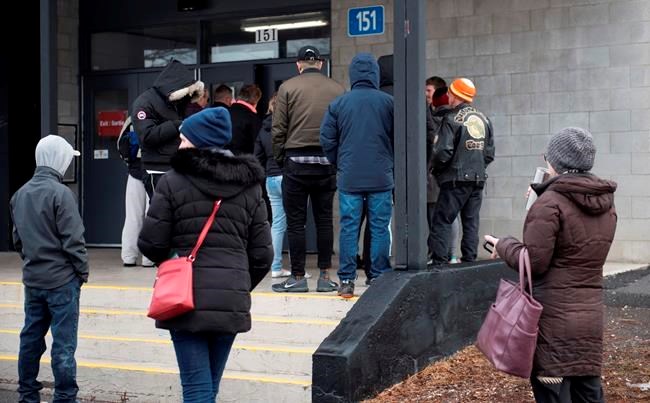TORONTO — Canada's top public health officer says supply limitations are forcing COVID-19 testing centres "to be smart" about who they can assess for the respiratory illness while Health Canada rushes to approve commercial testing kits.
Dr. Theresa Tam acknowledged Monday that laboratory supplies, as well as personal protective gear, were "key things" officials would like to see more of, as various jurisdictions clarified their criteria for who is eligible for tests.
She also said surging demand may in part be addressed by commercial kits and the possible adoption of equipment designed to test other illnesses.
"Every jurisdiction is looking at exactly how they manage their supply," Tam said Monday.
"Having said that, there's quite a lot of innovation in thinking in this field — for example, certain viral swabs might be in shorter supply so laboratories are actually testing other swabs that are in plentiful supply and how do we use those instead?"
She said manufacturers are also stepping up with new commercial kits.
"Health Canada is helping to review those really, really rapidly so that you have good quality testing kits and more of the commercial variety."
The comments followed an urgent plea by the World Health Organization for countries to step up testing as much as possible.
Director-General Tedros Adhanom Ghebreyesus admonished jurisdictions around the world for failing to gather the data necessary for a comprehensive response to the pandemic.
"We have a simple message for all countries: test, test, test," he said.
Nevertheless, various health officials said the push for broader testing has come up against practical limits and the need to prioritize of Canada's most vulnerable citizens, including elderly residents of long-term care facilities and those who have travelled to COVID-19 hot zones.
Prime Minister Justin Trudeau alluded to this over the weekend when he said he did not get tested in part because it would take a test away from someone who had symptoms. Trudeau is in self-isolation after his wife Sophie Gregoire Trudeau contracted the disease.
Tam said tests are being prioritized for certain types of cases: Travellers who have symptoms; those with severe respiratory illness, regardless of whether they've travelled; people in long-term care facilities with influenza-like illness; and hospital-related illness, including health-care workers who are sick. She emphasized, however, clinicians still have the ability to make their own judgement on who gets tested.
Infectious disease specialist Dr. Jeff Kwong stressed that social distancing is the bigger role in containing spread, arguing that as long as the general public employs stringent measures to limit contact with others, the need for tests will drop.
"Ideally, we would be identifying every single case but the question is: How many tests do you have to do to find every single one?" said Kwong, a family physician, faculty member at the University of Toronto and senior scientist at the Institute for Clinical Evaluative Sciences.
"It doesn't make sense to be doing thousands and thousands of tests just to find a handful of cases. To date we're only seeing maybe about 1.5 per cent of all the tests that we're doing coming back positive — so we had to do like 100 tests to find one person who has COVID. And so the question is: Is that enough? Is that not enough?"
Ontario's chief medical officer of health Dr. David Williams said the province's testing capacity has grown significantly over the past week from roughly 1,200 test per day, to well over 2,000 each day. As more centres open, he said the province should be able to conduct 5,000 a day.
Kwong works at Toronto Western Hospital, which is opening its testing clinic Tuesday, noting "everyone's scrambling and doing the best that they can."
Over the weekend, hundreds of people descended on an Ottawa assessment centre, only for many to be sent home without a test because they fell short of the criteria.
On Monday, another testing centre in Toronto's east end said on its website it was receiving too many calls to handle and repeated warnings that not everyone can be swabbed.
"Many do not qualify and are disappointed when they are told they will not be swabbed," a spokesperson for the Michael Garron Hospital said by email, adding that the facility saw close to 100 people per day over the weekend.
Possible symptoms of the disease include fever, new or worsening cough, sore throat, headache, muscle aches, fatigue, runny nose and joint aches.
In Quebec, Quebec Health Minister Danielle McCann said the province has enough tests and would be opening seven new centres on Tuesday that would allow testing to be ramped up to 6,000 per day, up from 1,600 currently.
She said the province was also training new personnel to work the COVID-19 telephone information line, which has seen call volume quadruple in recent days.
While increased staffing should reduce wait times, McCann asked Quebecers who aren't experiencing symptoms to leave the lines open for those who need medical attention, and to instead seek information on the province's website.
Dr. Brian Conway, president and medical director of the Vancouver Infectious Diseases Centre, couldn't help but draw analogies to his specialty on HIV infections.
He said the numbers of new cases should drive decision-making, noting "if the number of cases doubles in British Columbia today, then obviously something different has to be done."
"In every epidemic in the world, testing has always been a good thing. It's never been bad. (But) at some point tests for HIV were rationed. And then they became very widely available and regenerated all the information that we have now."
— With files from Morgan Lowrie in Montreal
Cassandra Szklarski, The Canadian Press




